Kategorie: ‘Mechanical Engineering’
Internship in Bilbao
- Automotive Engineering and Transport M.Sc.
- Spain, Bilbao
- FEV Iberia SI.
- 04/2023 – 09/2023
Application
I wanted to join the Erasmus mobility internship program with the primary goal of gaining international and intercultural experience. An important aspect of my application was that there was no formal process needed, as I had been working with the host company, FEV Consulting GmbH, for approximately half a year as a working student prior to this experience. This established connection eased out the process and facilitated my placement abroad. The choice of Bilbao, Spain as my destination was motivated by my desire to explore a country I had barely visited before, offering me the opportunity to dive into a new culture and language. Moreover, the presence of a FEV Consulting GmbH office in Bilbao made it a fitting location for my internship.
Accommodation and Living Expenses
Finding accommodation in Bilbao proved to be an interesting challenge, as my internship did not align entirely with the typical Erasmus semester. Student accommodations were already occupied, leaving little available options. Luckily, I found a shared apartment on idealista.com, where I lived with young professionals from Spain between the city districts Sarriko and Deusto. The apartment, although located slightly outside the city center, provided a comfortable place to live at a cost of 500€ per month, which included all expenses and even a cleaning service for common areas. It was recently renovated, though my private room was not particularly spacious, and the flat lacked a common living room outside of the kitchen. For future participants seeking accommodation in Bilbao, I recommend joining Facebook or WhatsApp groups for Erasmus students in advance to explore shared housing options. Alternatively, living in a hostel for an initial month while searching for a permanent flat is a viable option. Being present in the city allows for more convenient flat viewing. Important to highlight is not to search for a flat south of Calle Autonomia and the city district San Francisco. Crime rates a quite high and walking in the streets at night can be dangerous as many people get robbed there, even at daytime. Regarding living expenses, I found that approximately 350€ per month covered food and going out. Food prices were comparable to Germany, while drinks in bars were notably more affordable in Spain.
Internship
During my internship, I had an official eight-hour workday contract, although my effective working hours exceeded that throughout the entire internship. Within the consultancy firm, my responsibilities primarily involved desktop research and preparing presentations for the strategic management level of our clients. A significant highlight of my internship was to write my master’s thesis during a customer project, where I developed a Microsoft Excel model for assessing the cost of the battery recycling ecosystem. I also had the opportunity to give presentations in front of the customer, taking on additional responsibilities. Surprisingly, I found no significant cultural or professional differences when compared to the German offices of the company. This allowed me to seamlessly integrate into the work environment while making friends with my Spanish colleagues. The key takeaways in terms of work were advancing my proficiency in Microsoft Excel and internalizing the tools of a consultant. As the corporate language of the company is English, I couldn’t improve my Spanish language skills in the everyday work environment. Therefore, I remotely attended an intensive Spanish course at RWTH Aachen University with a scope of three hours per week, targeting language level A1. I highly recommend attending language courses in case the skills cannot be improved within the work environment.
Free Time
Bilbao offers several free-time activities, including visits to the beach, surfing, and hiking. The city’s closeness to nature and the well-established public transportation system with a metro and buses make these activities easily accessible. A must-visit are Sopelana Beach and Artxanda Mountain in particular. Additionally, I participated in cultural events such as the Pamplona bull run and city festivities that spanned 1.5 months, starting in early July. In Bilbao it is essential to know the Spanish language very well to make local friends, as most Basques do not speak English fluently. Furthermore, the attitude of the Basque people towards foreigners is rather closed, making integration into the society hard. To have a fun time, one should seek for making international friends which is quite easy when meeting other Erasmus students, as most of them have an open-minded attitude. Besides, it might be a good idea to search for tandem partner for both improving the language and getting to know local people. For exploring Bilbao, I highly recommend strolling around the city and visiting many different Pintxo bars. Besides, Bilbao has three main spots to go out. Calle Poza, Calle Ledesma and Casco Viejo. Calle Poza attracts mainly students and young people with its variety of bars. Calle Ledesma is a little bit more expensive and fancier, and the average age of people who go out there is slightly higher than at Poza. Casco Viejo is the old town of Bilbao. It’s very touristic and offers several interesting bars and restaurants at niche spots. Most common to go out are Plaza Nueva and Barrenkale. For those exploring Bilbao’s surroundings, I highly recommend visiting for example Pamplona, San Sebastian, Pikos de Europa, Bermeo, and Gernika. Being in Spain also offers the opportunity to visit Portugal or even Morrocco.
Conclusion
This Erasmus mobility internship experience has left a significant mark on my personal and professional development. I have integrated the lightheartedness of Spanish culture into my everyday life and mindset, which has brought a valuable perspective to my approach to work and life in general. Moreover, I learned the importance of balancing a busy consultant’s lifestyle with enriching free-time activities. This Erasmus+ mobility has further encouraged me to continue exploring foreign countries and cultures in the future. It has consolidated my belief in the great value of international experiences in shaping a well-rounded and adaptable individual.
Research visit at Cornell University
- Mechanical Engineering, PhD
- USA, Ithaca
- Cornell University
- 03/2023 – 05/2023
- Application/Finding an internship
Since the start of my Ph.D., I planned to do a research visit abroad, and I was constantly looking for research questions that were suitable for it. Even though my ideas did not really convince me, I scheduled a meeting with my Ph.D. advisor. In this meeting, we discussed possible research groups which fit my research topics. Based on this, I picked a research group and developed a work plan for the stay. With that plan, my advisor contacted the guest professor, which agreed to the exchange. The next step was the official application as visiting non-degree graduate student. I got an administrational contact person that help me with the application. Besides typical application documents like certificates and a statement of purpose, proof of financial resources is required. A fellowship granted by Cornell University covered my tuition fee, so I only had to proof financial resources for living expenses and obligatory health insurance. Once the application process was completed, I received my admission letter and the I20. Both documents are required to apply for a visa. I started the application process 3.5 months before the start of my visit. In the end, I almost ran out of time and received my visa just a week before departure. Hence, I recommend starting the application process earlier.
- Accommodation & Living expenses
The beautiful campus of Cornell University lies on a hill above the city center of Ithaca. In close vicinity to the campus is College Town, which is the main area for student living (like Pontviertel). The convenience comes at a cost. In my experience, prices are quite high and conditions low. I spent 800$ on a small (12m2) room in a six-bedroom apartment with only one bathroom. Luckily, there were only three of us living there. To find an apartment, I asked the administrational contact person for help. Even though that provided some opportunities, I took the room that I found online on apartments.com. In general, I think it is not necessary to live in College Town. The local buses, which Cornell University operates, are free of charge for students and cover the city well. Living expenses are, in general, higher. For lunch on campus, you have to spend between 8 and 15$. In particular, groceries are substantially more expensive than in Germany, making it almost as expensive as going out for food.
- Everyday life/the internship
My everyday life was similar to my life at RWTH Aachen University. I got an office space in Upson Hall, which is one of the engineering buildings. The group that I visited covered two office rooms plus the office of the guest professor. My office space was within these office rooms, so I was fully integrated into the group. The group was very kind and made me feel very welcome. We went together for lunch or had dinners together. A small difference to my everyday life in Aachen was the more spontaneous interaction with the guest professor. He was basically every day available for discussions, which he showed by leaving the office door open.
- Free time/tips
Ithaca is smaller than Aachen but provides enough things to spend your free time. In addition, I highly recommend renting a car to discover the surrounding countryside. To keep this easy, I list my highlights in Ithaca and the surrounding countryside:
- Watkins Glen State Park
- Cascadille Gorge Trail
- Taughannock Falls State Park (The park at the lake is also very nice)
- Ithaca Farmers Market
- Ithaca Beer Co, Liquid State, Garrett, Salt Point (Breweries that serve delicious beer and tasty food)
- Rhine House (Best bar)
- Dos Amigos (Best burrito)
- Conclusion
My research visit at Cornell University was professionally and personally a success. I substantially advanced my research, bringing me a step closer to my Ph.D. Moreover, I gained helpful impressions about the American academic system, which are helpful for planning my future career. Finally, I met so many nice people that I look forward to seeing again.
Writing my Master’s thesis in Paris
- Business Administration and Engineering: Mechanical Engineering M.Sc.
- France, Paris
- Neoen SA
- 10/2022 – 03/2023
I had the opportunity to write my external Master’s thesis at Neoen in Paris and had a very positive experience. I generally recommend gaining experience in a company, whether in your home country or abroad, just before the end of your studies, as it helped you better understand the sector and learn a lot. Neoen SA is a French company that operates in the renewable energy sector and was founded in 2008. The company is involved in the development, construction, and operation of wind, solar, and energy storage projects and is headquartered in Paris. With over 6 GW of renewable energy projects worldwide and a strong focus on sustainability and innovation, Neoen is a key player in the renewable energy sector.
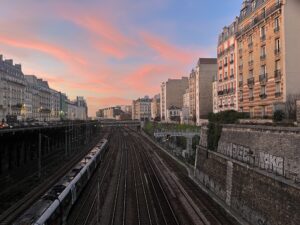
© Marie-Sophie Braun
It was much easier than I expected to find a PhD-student willing to be my responsible party from university side to supervise the thesis. None-the-less it remains a lot of extra work in terms of organization and also identification of a topic that will meet all the needs. Also, you do have to acknowledge that at some points, you will have to help out with non-thesis related tasks at the company: It will be a strong learning opportunity, but requires a lot of self-organization, especially in a foreign country.
The experience of living in France was particularly emotional for me because of a close connection to France from my childhood and family bounds. I thoroughly enjoyed the purely French environment and appreciated being able to speak the language in a work context. I do emphasize that a solid language level is a prerequisite for most of the French work environments. Even if the official language in companies could be English, I guess you could be the odd-one-out if you are the only person in the company not speaking the countries language and while it would be a problem for work-related topics, it might be difficult for a chat at the coffee machine.
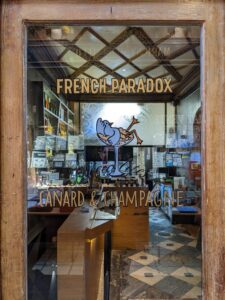
© Marie-Sophie Braun
The parisian work environment is very chic and neat. Jeans or sneaker were not seen. Guys weren’t allowed to wear polo’s at work and this will go without saying. Good clothing and good food are important in France in gereneral, I assume: This includes long breaks for lunch and an additional espresso after the meal. Even though, people are very chic, everyone was very friendly and open-minded.
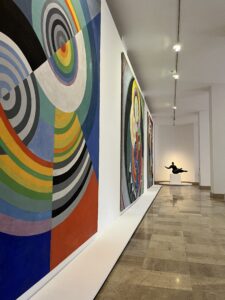
© Marie-Sophie Braun
I lived in Batignolles, in the 17th arrondissement and fell in love with the part of the city. It is a very nice, safe and friendly neigboorhood. Additionnally, I was able to get everywhere quickly by bike, which is the best means of transportation in Paris. I also recommend cultural centers (tiers lieux) and state museums, which are free for people under 26.The night life in Paris is very dense and differentiated. Depending on where you go it will be different. Less touristic parts of the city can be found for example in the 11th or 12th arrondissement and also, you should watch the sunset from the top of the parc de Belleville there. People more often meet outside then inside because appartments are small and the French terrasse-culture is very strong. In all seasons, you will find people outside and in a good mood.
In conclusion, I strongly recommend to anyone who speaks good French the opportunity to write their Master’s thesis in Paris. I had only had the best emotions. Although Paris is not a cheap city, I was able to pay the rent with the company’s expense allowance and overall had a very positive experience.
Writing my thesis at the Imperial College London
- Chemical Engineering M. Sc.
- United Kingdom, London
- Imperial College London
- 10/2022 – 04/2023
Preparation
Preparing for my time in London was simultaneously very easy and very stressful. For context I had 2.5 months time between my acceptance to the Erasmus scholarship and ICL and the beginning of my time in the UK. For most topics, such as getting a visa, finding a RWTH advisor, getting to London, etc. it was fairly simple to organize every thing. The most difficult task was in fact finding an apartment in London. As this probably takes the most amount of effort, I will start here.
Put simply, the London housing market is very expensive and the number of people searching for apartments seems to far outweigh the number of apartments available. Depending on the location and the size of the room, apartments seem to typically cost between £700-1200 per month, with the average being around £860 based on what I saw and heard from others. I had the most success finding an apartment via the websites Spareroom and Spotahome . If you already have a bachelors degree, Gradpad is another good place to look for apartments. The best method is to start messaging potential landlords early and to try and not be too picky with the offers you get. Many landlords are flooded with requests and will frequently not answer. In such a large city, it is normal to have a commute of 20-30+ minutes to the university, but due to the great public transport, living farther away from the campus should not be too much of a problem. The ICL campus I was located in is found in South Kensington, so I would base my search in the surrounding boroughs (districts). A cheap way to get to university is to take a bike, and the tube is also always a viable (although somewhat expensive) option.
I lived in Battersea and took a bike to and from university everyday which worked really well for me, although cycling in London is not quite as comfortable as cycling in Aachen.
For the duration of my stay, I was informed by the ICL International Student office that I needed to enter the UK under a standard visitor visa which allows a student to study in the UK for a period of up to 6 months. As a EU citizen and German national, I was not required to go through any formal applications or receive any formal documentation as there is an agreement which allows EU citizens to enter the UK as standard visitors without a visa.
Filling out the Traineeship agreement was fairly simple, I wrote a draft version for the agreement myself which I believed best fulfilled the requirements and sent this to both my RWTH and ICL advisors. I would recommend do this yourself and then possibly correcting the agreement as opposed to waiting for this to be done by someone else.
Finding an internal RWTH advisor was done by getting in contact with the Erasmus team from my institute (AVT). I then sent a description of the work which I wanted to do at the ICL (which had been agreed upon with my ICL advisor) and then a suitable advisor was found.
Arrival
Getting to London is fairly simple. There are a large number of airports to fly to, although it is likely the most comfortable to fly to London Heathrow. If you want to take a train, there is also a good train connection to get to London from Aachen. I personally drove my car to London via a ferry from Calais to Dover which allowed me to take a few more things with. This was also surprisingly easy. Important if you choose to drive in London: there is an Ultra Low Emission Zone for which you need to pay to be allowed to drive in London. By simply googling the Ultra Low Emission Zone and how to pay for it, you can save yourself from being fined. As usual with any sort of travel booking earlier is always better.
Living in London
London is a wonderful city to live in full of exciting things to do. No matter what it is you want to do, there is guaranteed to be at least 3 different places where you will be able to do it. There are a lot of opportunities to go out during the day or in the evenings with your friends. Sports, bars, clubs, museums, parks, the list goes on and on. Three things I personally took advantage of were the great selections of musicals that you can visit for a relatively affordable price, the great salsa/bachata dancing scene, and the wonderful green parks. However, being such a large city with so many things to do also means that traveling between locations often takes a significant amount of time (I felt like everything was always at least 25-30 minutes away from wherever I was). My way with dealing with this was to ride a bike between locations and then jump on the tube as necessary. Riding a bike in London requires a certain amount of confidence in your biking skills. The drivers in London are not very good and they tend to pay less attention/respect to cyclists than in Germany. So people won’t be running you over, but you also should be confident in taking space as it is available. Otherwise cars will try to squeeze by you which can become dangerous. That being said, the city is always improving for cyclists and there now exist a number of bike lanes which significantly improved the safety of riding through the city. I rented my bike from Swapfiets which was a great deal for just £19 per month with all repairs etc included, however there are also many Santander rental bike stations spread across the city with which you can also travel.
My impression of living in London is that the city has a lot to offer, and it is up to you to take advantage of it. I was almost always busy thing evening plans. But if you don’t actively look for things you want to do and make plans to do them, then London can quickly become a oversized and anonymous city which is not the best to live in.
Studying at ICL
As a Master’s student writing my master’s thesis, I was left with a lot of independence on how I wanted to study at the ICL. I worked in the Sargent Center for Process Systems Engineering and I was immediately integrated into the center as one of many other researchers. PhDs in the center work in large office spaces with individual desks, which gives a nice mix between social interaction amongst colleagues and still the privacy of your own work space. I was treated no differently from a PhD student and had my own desk from which I could work.
Being at a foreign institute, you are forced to take a lot of responsibility and initiative into your own hands. The professors at the ICL are some of the best in their fields, however they are busy people and expect you to be able to make steady independent progress. I had a weekly-biweekly meeting with my advisor where I could show my progress and get input on problems I was having. But as one would expect of a Masters student nearing the end of their degree, it is mostly up to you to solve small problems and come up with the direction of your work. I found this style of advising similar to my experiences in Aachen, so I do believe that RWTH students are well prepared for this style of work.
It’s important to keep an eye on what you need to do for the RWTH, such as the Erfassungbogen, etc. as the professors in Imperial will likely not know about these things and you will have to help shape your thesis so that it still fill the expectations of the RWTH.
Final Impressions
Overall I absolutely loved my time in London. Imperial is a world renowned university and things I learned have certainly helped me develop in new ways beyond what I learned in Aachen. I would highly recommend anyone thinking about traveling to London and the Imperial college to do so.
My stay in the modern town of Delft
- Robotic Systems Engineering, M.Sc.
- Netherlands, Delft
- Delft University of Technology
- 08/2022 – 02/2023
I am a master student from RWTH Aachen, Germany. My first impression of Delft was that it is a very clean and modern town, which is reflected in the clean and tidy train station. The greeting drivers on the bus, the friendly waiters in the restaurants and the passers-by who welcomed me to Delft all proved the warmth of the people there.
Culture shock
The biggest culture shock was the heavy use of bicycles. In Aachen, bicycles are not the most dominant mode of transportation, probably because the city is not very big and some of the roads are not smooth. But Delft has a surprisingly large number of bicycles, and it certainly is the most dominant form of transportation in Delft. There are two-way bike lanes on both sides of Delft’s roads, which provides a huge convenience for cycling. Therefore, if you are coming to the Netherlands for an internship, my most recommended mode of transportation is by bike. Another culture shock is the book bags hanging in front of many houses. I didn’t know much about this phenomenon at first, but after asking friends and checking the internet I realized that hanging school bags is how Dutch students celebrate graduation. Another interesting phenomenon is the way people relax
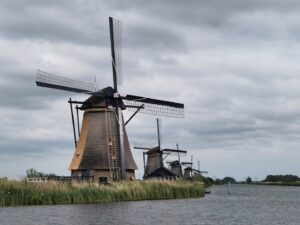
© Disen Wang
on weekends, which is boating. This is a phenomenon that can only be seen in parks in China and Germany. Probably because there are many rivers in Delft, I found that many families have their own boats and have the habit of boating, which I think is a very interesting way to have fun. The most comfortable thing for me is the widely use of English and the cashless shopping, which is not available in Germany. The English language is so widespread in the Netherlands that you can live in the country without any problems even if you don’t speak Dutch. I don’t need to carry a lot of cash every day because of the wide use of cards payment. One thing I don’t quite understand is that when it comes to cash transactions, the smallest unit is 5 cent, and they won’t give back any change less than 5 cent. I hope you won’t stand at the counter like me and wait for them to find the money.
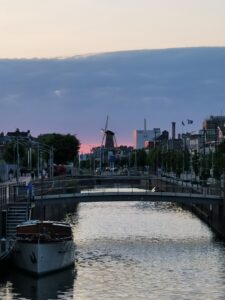
© Disen Wang
Health insurance
As an international student with German insurance, it is not difficult to visit a doctor in the Netherlands and you do not need to apply for new insurance. You can use your German insurance to visit a doctor in the Netherlands, but the process is a bit different than in Germany. The German insurance card cannot be used directly in the Netherlands, so you need to pay for your own medical expenses first and then fill in the reimbursement information on the German insurance company’s website. I went to the dentist in Delft, and I was able to get reimbursed by my German insurance company for both the doctor’s visit and the medication. However, not all medications are reimbursed, and some may not be covered by insurance. My total cost was 97.11 Euros and was finally reimbursed 92.11 Euros, and the result of the review was issued within a week, which was acceptable to me. Of course, I still hope you won‘t get sick!
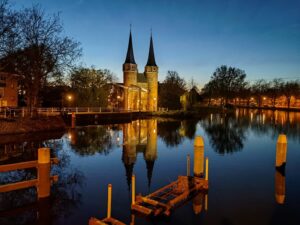
© Disen Wang
Travelling
First of all I would like to start with a few words about train rides. Unlike Germany, you need to go through ticket machines to enter and exit the stations in the Netherlands. In addition, the ticket prices in the Netherlands are fixed and do not change with the date of purchase like in Germany, which is very friendly for people who do not like to plan their trips in advance. I also highly recommend getting an OV chip card, which can be used for most trains and buses in the Netherlands, so you only need to swipe it when you get in and out of the station, no need to buy tickets online. Rotterdam is a very modern and clean city with a lot of skyscrapers, which is not like a typical European city. The Kinderdijk, located near Rotterdam, is one of the most impressive tourist attractions for me. The beach in Den Haag is very beautiful and I like it best in the evening, when the crimson sunset shines on the beautiful clouds and the beach, and you can see some boats and windmills in the distance. Amsterdam is also a city I really like, it is more historitic compared with Den Haag and Rotterman. The Royal Palace of Amsterdam is gorgeous. The Van Gogh Museum and the Dutch National Museum are also well worth a visit. Another point worth mentioning is
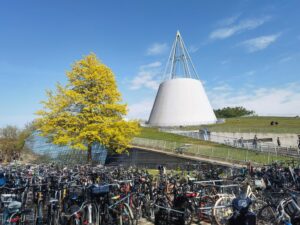
© Disen Wang
that most of the attractions in the Netherlands have audio guides in several languages, including but not limited to English, Chinese, Dutch, French and German, which is really friendly to foreign visitors. The following pictures were taken by myself. The first three are in Delft and the last one is in Kinderdijk.
All in all, I really enjoyed my visit to the Netherlands. If you also like to explore different cultures, please don’t hesitate to come to the Netherlands, you will never regret it.
Internship at Bosch in Austria
- Mechanical Engineering B.Sc.
- Austria, Hallein
- Robert Bosch AG
- 10/2022 – 03/2023
After postponing my mandatory internship for as long as I could due to the covid pandemic, as I wanted to do it abroad, I finally decided to do it during the winter semester of 2022. Since it was during winter, and I really like skiing, I decided to search for internships in Austria and Switzerland. This is where things started to get a little complica

© Ralph Rauhut
ted: The mandatory internship for the Mechanical Engineering B.Sc. degree has to cover very specific topics to be accepted as such. Only few companies have the capacity to offer all the tasks that are needed to acquire the requested experience.
I searched all over the internet for internship openings that met the needed criteria. As there were only few openings, I knew that I had to polish my application documents to even have a chance of getting the internship. I asked help from friends to improve my CV and motivation letter, and gathered letters of recommendation from my previous bosses. After a couple of negative responses, I finally got invited by Bosch in Hallein to two online interviews (for a total of four internship openings). Each interview was held by a manager from the respective area, and someone from HR. The interviews were very relaxed and felt more like a normal conversation with friends, where we talked about my background,
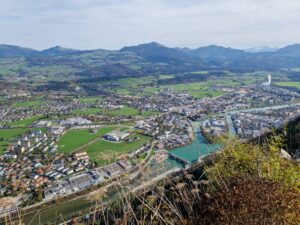
© Ralph Rauhut
my goals for the internship and about the internship they were offering. About a week later I got the best possible response: I was offered all four internships they were offering. After analyzing all the offers, I picked the one that matched my interests and the ones from the university the most. Now it was time to get ready to move to Hallein, a small city around 15km from Salzburg.
Through WG-Gesucht I found a furnished room in a shared flat with two other flatmates in Hallein. It is also possible to live in Salzburg and go by train to work every day, it only takes around 30 minutes from Salzburg to Hallein, but I think I made the right decision of living in Hallein and having a shorter commute time. Despite being a rather small city, Hallein has everything you need to live comfortably: Supermarkets, Gym, Restaurants, etc. The only thing Hallein lacks, is the nightlife. But thanks to the good train connections, going to bars and parties in Salzburg is not a problem. What Hallein lacks in nightlife, it has in nature. Hallein is surrounded by mountains with peaks like the “Barmsteine” and a big river, the Salzach, which crosses the whole city. Close to the city you have a lot of hiking trails into the mountains. In winter you can reach a lot of ski resorts in less than an hour by car. My favorite ski resort was Obertauern: Cheap, good snow and good slopes.
The internship at Bosch couldn’t have been better. Before my arrival they sent me a brochure with all sorts of information, including information about the city, the documents I would need, possible accommodations, how to take vacations and how the check-in system worked. As soon as I arrived at Bosch, I was assigned a tutor who was in cha
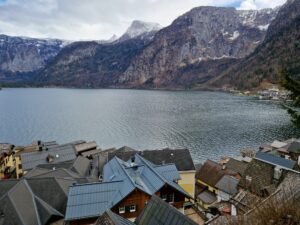
© Ralph Rauhut
rge of explaining to me how everything worked in the company. I had a lot of freedom to choose which projects and with who I wanted to work. Everyone at the company was friendly to me, and I never felt being treated differently for being “just” an intern. I had to assume a lot of responsibility, but I was also awarded the respective recognition. The company also offered a lot of benefits, like discounts on different store
s and cheap meals (3 EUR for a 4 course menu). During my internship I learned a lot and made some important connections that might help me in my future career. There were also many other interns with whom I became friends with and continue to stay in touch after the internship ended.
During the weekends I was always on the go. When I arrived to Austria I purchased the “Klimaticket Ö” which allows you to take any train or bus you want in the whole country. During the warmest months here, namely October and November, I often went hiking with friends or exploring different cities like Hallstatt, Innsbruck or Vienna. During the other months I was mostly skiing in different ski resorts around Salzburg. To go partying, if après-ski is not your thing, I would recommend going to Vienna, but Salzburg also has some decent clubs.
In the end I can say that I really enjoyed my time here in Hallein and at Bosch. The people I met in Austria were very kind and made me always feel welcome. Even though I really liked Hallein and Salzburg, I prefer bigger cities to live for a longer period. That’s why I am aiming towards getting a job in Vienna at Bosch once I finish my master’s degree. I will, however, definitely come back to Hallein to visit the friends I made during my stay and to go skiing with them on the nearby mountains.
Experience Report on my Erasmus+ Traineeship at Bentley Motors in Quality Planning in Crewe, UK
- Business Administration and Engineering: Mechanical Engineering M.Sc.
- United Kingdom, Crewe
- Bentley Motors Ltd
- 08/2022 – 03/2023
I. Setup and visa
Where to begin…
This was probably the most nerve-wracking part of the entire Erasmus experience. I had my job interview in January 2022 while I was still on my internship with Porsche. During the interview I asked my interviewer and my future line-manager: “Well I really appreciate the chance to interview for the position, but do you know how we will deal with the visa requirements for the role?” to which he replied “If we decide to go with you as a candidate I will offer you all the support I can and if there is a will there is always a way”. Reason for asking this was obviously the Brexit which means that for all academic and job purposes a visa is required.
At the time of writing this there were two main visa routes to do an internship in the UK: The “GAE” visa and the “Skilled Worker Visa”. Unfortunately due to the high cost associated the latter was not an option. The Erasmus Programme generation until 2021 was a government approved exchange scheme eligible for a “GAE” visa which meant this was the only visa route I was able to take. This is why my internship was carried out as an Erasmus Placement. The subsequent Erasmus program generation is not eligible for this visa unfortunately.
You may think now “but why can you be an Erasmus student from the 2021 generation in 2023?”. The reason for that was that which generation you belong to is dependent on where the funding of the scholarship comes from. So the RWTH provided me the scholarship for an Erasmus Exchange from the budget of the 2021 program generation so I could actually get a UK visa for my placement. This method unfortunately ends working in May 2023 which is the end of the grace period given by the UK government.
For everybody trying to undertake an internship in the UK I heavily suggest getting in touch with the international office to explore options that are right for you. There is a list of government authorized exchange schemes for the UK on the gov.uk website. When you are in touch with a company you want to intern with, check if they have a contract in place with a company such as “Tier5Intern” or “ASGVisa” who offer authorized exchange schemes for foreign students. Plan at least 4 months (ideally 6) to deal with all the paperwork, errands and research required to make it happen.
It is a difficult path to be honest, but my line-manager was right with what he said to me during the interview. Best advice I can give on this matter is to stay persistent and encourage on-going communication between the international office, your company’s HR department, yourself and your manager.
II. Bentley Motors and the Quality Management role
Bentley Motors is a luxury car manufacturer based in Crewe, UK, known for producing high-end cars. The company has recently embraced new technologies and has focused on expanding its product range to include SUVs and electric vehicles. Bentley’s new strategy, called Beyond100, aims to become a global leader in sustainable luxury mobility, with a goal to become a fully electric brand by 2030 and to reduce its carbon footprint by 75% over the next decade. Key competitors include other luxury car brands such as Rolls-Royce, Aston Martin, Jaguar Land Rover, and Porsche.
As already mentioned, my placement was within the Quality Planning department. For me this role helped me expand my horizons in terms of work dynamic first and foremost. Because my previous role was production oriented, I was often pre-occupied with “firefighting” and dealing with new topics that came up adhoc. In my new team at Bentley the dynamic is very different. The quality planning department is split into two main branches. The first one is managing part approval and part maturation for new vehicle projects. The second branch primarily manages quality topics in the concept stage of a new vehicle project. Thus the work was overall more about looking ahead focusing on proactive quality management. That is why the placement helped broaden my horizon not just in terms of factual knowledge but also different workplace dynamics.
My placement project revolved around (re-)defining and writing the departments project deliverables in-line with Bentley’s new vehicle project management framework (in short PEP: “Product Emergence Process”). For this I held workshops with the relevant stakeholders to define who in the department is responsible for each activity within a certain process and then defining that process on a high level. This may sound tedious on the surface, but it was quite important since the department is measured against these deliverables as a vehicle project progresses. As part of this project I was able to improve my own project management, presentation and influencing skills.
Alongside this project I was also able to spend time in both sub departments because I made point to learn about the PEP-deliverables before attempting to define them. Thus I took part in various competitor benchmarking events, vehicle design assessments, went on supplier visits, took part in ergonomic studies, conducted maturity level assessments and of course, also spent some time with the product. In addition I got to learn about other functions such as our internal laboratory, production, product audit and the sourcing process in general.
One thing that stuck out to me is the difference in working culture between the UK and Germany. In my previous internship I found the company hierarchy to be quite steep for example. At Bentley the hierarchies are relatively flat compared to other Volkswagen group companies from what I can tell. I have also found that your formal education or position has a smaller impact on the way people treat you. In general people seem to give you responsibility and tasks purely based on your own ability which I find very positive. A lot of the people I got to meet had more varied work experiences compared to what I knew in Germany. Some of them have been in the military and then worked on the line before becoming quality engineers for example. Also there is a very large focus on upskilling in the job. So a lot of people I met worked their way into the position they are in organically, whereas in Germany people in similar roles all have B.Sc.’s and M.Sc.’s.
One thing I also quite enjoy is the “banter”. In Germany most people are very straight to the point and often quite serious. Contrary in England people tend “dance around” certain topics especially if they have a request. For example it is quite customary to have a short chat before getting to the actual point. Also people are more open to make a joke here and there to lighten the mood even at work (within reason). At first, I had to get used to these things a bit, but I find it makes day to day work much more enjoyable.
III. Experience in Crewe, UK
Bentley Motors is based in Crewe which is in Cheshire. I choose to live in Crewe during my placement year because I wanted to make sure I am close to my place of work. The reason being that even though Bentley has a flexible working system, I wanted to make the most of my time and be in the office as much as possible.
Crewe has both its good and bad aspects. I don’t want to sugarcoat it: there are probably more bad aspects than good. While it has a rich industrial history, the town has struggled with economic decline in recent years. As a result, the town may not be considered the nicest place to live by some. That said, living in Crewe is affordable, and it offers access to transportation links, making it a good base for exploring other parts of the UK and getting away from Crewe. For example it is easy to get to metropolitan areas such as Manchester, Liverpool, and London. If you are more in the countryside, it is also possible to get to Wales and various national parks such as the peak district from Crewe. Also most of the other industrial placement students lived in Crewe as well which meant it was good for my social life to not live in a prettier city nearby (for example Nantwich).
IV. Conclusion
Even though the process of getting the visa was cumbersome, the experience during the placement made it all the more worth to go through the effort. I got to meet a lot of interesting people both on and off the job from which I learnt a lot. Also I found that I quite like living in Britain in general and enjoy the culture.
In fact I enjoyed it so much I applied for a permanent position in the department I had my placement in. So with the end of my placement I started a new position in the role of “Senior Engineer – Product Quality” and ended up not returning to Germany to do my M.Sc. at the RWTH.
If that doesn’t speak volumes about how much I can recommend to anyone to undertake a similar work experience, then I don’t know what does.
V. Recommendations
In the last part of this report I would like to give some useful tips to anybody moving to the UK.
- To get paid you need a UK bank account: For this I can recommend “Wise” since you can open an account while you are still in Germany.
- For finding accommodation I can recommend the platform “SpareRoom” (for house shares) as well as Zoopla and Rightmove
- If you move into a house share a lot of them are “HMO’s”. This means they are not managed by a private group of people but a company. Thus don’t be surprised if you don’t get to meet your roommates before moving in. I recommend getting a property with a low minimum tenancy length so you can move relatively soon if you don’t like your accommodation or meet other people you would rather live with.
- Make sure to get a UK phone number as soon as possible. It will make your life much easier down the line. For a monthly contract I can recommend Smarty as a provider. Overall mobile contracts are much better and cheaper than in Germany.
- If you company offers a pension scheme, get on it asap and keep the related documents in a safe place. In essence this is the company giving you free money to invest for your retirement. All the returns from this are tax-free for life. Over the course of your placement this could add up to well over a thousand dollars from which you only invested a few hundred pounds of your own money.
Highly recommendable internship in Liechtenstein
- Business Administration and Engineering: Mechanical Engineering M.Sc.
- Liechtenstein, Schaan
- Hilti AG
- 10/2022 – 03/2023
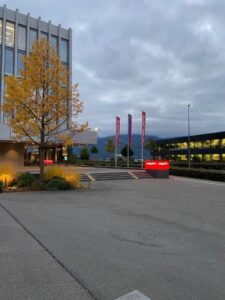
© Phil Brune
Hilti AG is a multinational company that specializes in manufacturing and supplying construction tools, systems, and services. It is committed to sustainability and social responsibility and is known for its high-quality products and innovation in the industry.
Preparation:
After I received my acceptance for the internship in Liechtenstein, I immediately started looking for an apartment. Immediately it became clear that it is not allowed to live in the country itself. So, you must decide whether you want to live in Switzerland or in Austria near the border to Liechtenstein. Clear recommendation: Feldkirch in Austria. Pretty much all interns live there, and it is a very nice old town.
Unfortunately, I was quite unlucky with my first apartment. One of my roommates was very unpleasant. That’s why my advice is to find out exactly where you’re moving to and which landlord you have. Without naming names, I can advise against a few.
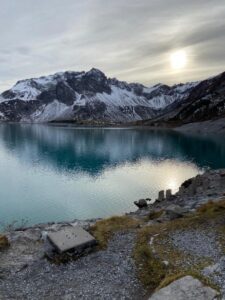
© Phil Brune
Daily life/Going out:
Before I moved to Feldkirch, I was worried that due to the size of the city (approx. 30,000 inhabitants) there would hardly be anything going on at the weekend. This fear was to prove unjustified very quickly. Feldkirch is a very lively and up-and-coming city. The high percentage of young people and the many bars and dance clubs made me feel at home right away.
Every Thursday, Hilti organizes an “Interns Dinner” for 30 interns in different restaurants. This way you meet new people every week and can expand your international network and make new friends. So you have a direct connection when you start new at Hilti.
Due to Feldkirch’s perfect location, in my opinion, there is plenty to do on the weekends, both in summer and winter. Especially if you’re into outdoor activities, you’ll love it. From hiking and biking to skiing and sledding, there is something for everyone. It’s a stone’s throw to Switzerland and Italy isn’t far either. Together with a few interns, we were in Bern, Zurich, Innsbruck, Turin and Milan, for example.
Work at Hilti AG:
Hilti has its headquarters in Liechtenstein. Both the first production facility (Plant 1) and some business units are located there. The working environment is
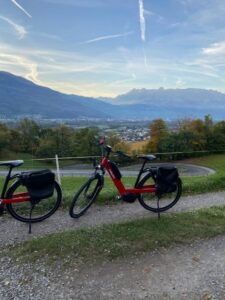
© Phil Brune
very international. I was able to expand my network a lot during the internship. There are about 80 interns working there, all of whom come from all over the world. For example, I was able to improve my English a lot.
Overall, the working atmosphere at Hilti is very pleasant and I can highly recommend the company. And the pay is excellent, by the way.
All in all I can highly recommend to do an internship there.
Getting to know a different culture
- Mechanical Engineering B.Sc.
- France, Signy L’Abbaye
- Beuret Sarl
- 09/22 – 12/22
My internship in France
The company I worked for produces agricultural equipment and steel structures for buildings. Since the company moved to a new location recently, they needed new custom equipment like tool cart for storing and moving heavy tools. I spent the majority of my time developing, designing in the office and manufacturing this equipment in the factory. Having the responsibility for those projects and completing them was a truly rewarding experience.
Even though I did not work on the division of the company that was responsible for the buildings they let me go on the respective construction sites a few times during my stay. Although this was not at all part of my internship, I still enjoyed discovering the big machines and assembly techniques they used to join the massive components that were previously prepared in the factory.
Working in a small company (about 10 persons in total) helped me to get to know all the people very quickly. I had a great relationship with both the employees and the supervisors from the beginning on which made my time in the company really enjoyable.
I worked a total of 40 hours a week which is not necessarily typical in France. Many people only work 35 hours. This makes room for other activities after work. Also, the meals have a much greater importance than in other European countries. Lots of companies have 60 to 90-minute lunch breaks and it is common for grocery stores and other shops to close during midday. But many stores make up for this by opening their doors on Sunday morning.
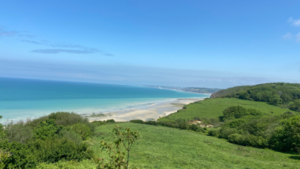
© Dimitri Robert
Luckily, on Fridays I only worked till 12 pm which made it possible to plan longer activities for the weekend. I tried to discover as much as possible of the “Champagne” region. It’s especially known for its production of champagne and its vineyards.
On another occasion I had the opportunity to travel to the beaches of the Normandy and admire the breath-taking landscape. These places are not only beautiful but also have an undeniably interesting historic relevance.
Travelling to these different destinations by train is difficult and takes a lot of time. In addition, the company I worked for was situated in a very rural area. So, having a car was a necessity in this region of the country.
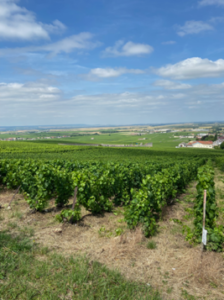
© Dimitri Robert
Something you need to get used to when you live in France are long and late dinners. Most of the time, they start with the well-known “apéro” where you have a few drinks and snacks before beginning to eat your meal. I really enjoyed those convivial evenings. I also observed that drinking wine at dinner was a lot more common than in Germany. Even a lot of young people enjoy drinking a glass of wine instead of beer. In general, the locals are proud of their local wine and especially champagne.
Helpful information
Good news is my phone worked without any issue thanks to EU-Roaming. On the other hand, German mobile network operators have put in place a limit of months that you can spend abroad. Exceeding this time limit will result in them charging you extra roaming fees. Luckily, many French carriers provide very generous offers for the first year of contract. Combined with a pricing that is generally much lower than in Germany, getting a mobile plan with a lot or even unlimited data becomes very affordable. Your mobile plan can even replace Wi-Fi. So, if you plan on staying more than a few months in France, I would definitely recommend getting a French mobile plan.
Same thing goes for your bank account and credit card. You should check with your bank if the card you plan on using works abroad. Opening a bank account was not necessary for me but it made withdrawing money free of charge and receiving my salary was also easier this way.
Keeping in mind that finding a fitting internship and going through the application process would take a bit longer than in my home country, I started to plan my stay more than 6 months ahead. This gave me enough time to prepare everything properly and I would recommend this to anyone who wants to go abroad. All in all, my internship abroad was a great experience for me. Getting to know a different culture and improving my language skills while completing a mandatory part of my curriculum was amazing and I would recommend it to anyone who has the opportunity to do so.

